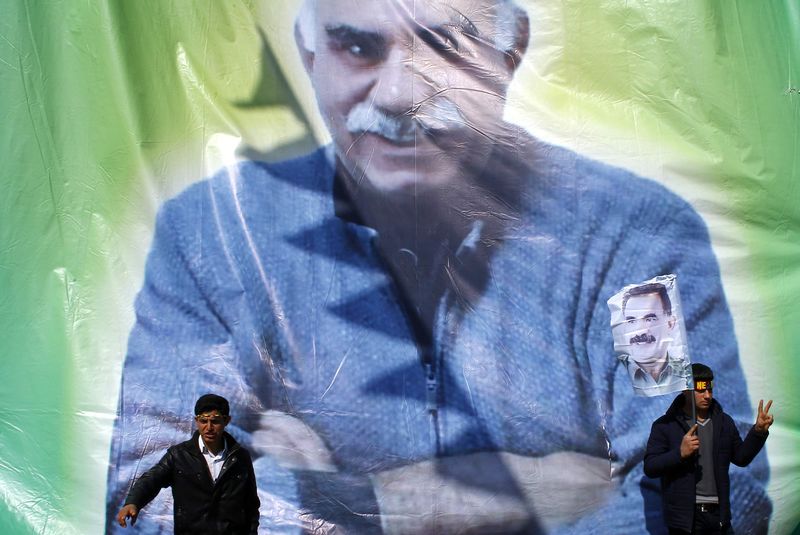By Daren Butler
DIYARBAKIR, Turkey (Reuters) - Jailed Kurdish rebel leader Abdullah Ocalan said on Saturday his militant group's three-decade insurgency against the Turkish state had become "unsustainable" but stopped short of declaring an immediate end to its armed struggle.
In a message relayed by Kurdish politicians to tens of thousands gathered in the southeastern city of Diyarbakir, the leader of the Kurdistan Workers Party (PKK) urged his militant group to hold a congress on laying down its weapons.
"This struggle of our 40-year-old movement, which has been filled with pain, has not gone to waste but at the same time has become unsustainable," Ocalan said in the message, read out at a rally to mark the Kurdish "Newroz" New Year celebrations.
President Tayyip Erdogan, then prime minister, launched talks with Ocalan in late 2012 to end an insurgency that has killed 40,000 people, ravaged the region's economy and tarnished Turkey's image abroad. Progress has been faltering since then, but Kurdish faith in Ocalan remains undiminished.
"History and our people are demanding from us a democratic solution and peace in line with the spirit of the age," he said, calling for the congress to determine the PKK's "political and social strategy in harmony with the spirit of the new period".
Erdogan, who triggered anger last weekend by suggesting there was no "Kurdish problem" in Turkey, said in a speech hundreds of kilometres away in the southwestern city of Denizli that he hoped Saturday would mark a turning point.
"Let it be a cornerstone that truly combines love ... not a Newroz like those of the past, when everywhere was burned and destroyed by Molotov cocktails, stones and fireworks," he said.
Young men in green guerrilla outfits and women in brightly coloured dresses danced as patriotic Kurdish songs played. Organizers claimed a million people attended, but there were no official figures.
Large screens each side of a stage showed Ocalan's face while many waved the flags of his militant group, deemed a terrorist organisation by Ankara, the United States and the European Union.
The mere display of Kurdish insignia, let alone an image of Ocalan, could have brought arrest and imprisonment less than a decade ago. It still enrages many nationalists.
"Kurds are using this day, Newroz, as an occasion to challenge the state," Devlet Bahceli, leader of the nationalist MHP opposition, told a party congress, accusing the AKP and the PKK of "digging a pit for Turkey".
"Those traitors who are throwing Turkey's future to the fire will be burned in that fire ..."
ELECTIONS
The peace efforts have also revealed tensions between Erdogan, who seeks executive powers as president but does not constitutionally have them, and the government.
In unusually direct criticism, Deputy Prime Minister Bulent Arinc accused Erdogan of being "emotional" and of meddling in government business after he said he did not agree with the establishment of a committee to monitor the peace process, a step agreed with Kurdish politicians.
"It is the government which is running the country," he told reporters. "The president speaking like this, to the point of criticising our government, may wear out the government."
At a "Newroz" event two years ago, Ocalan, jailed since 1999 on an island near Istanbul, declared a ceasefire and said it was "time for guns to fall silent".
His fighters began withdrawing to Iraq two months later under a deal envisaging increased rights for Kurds, who make up around 20 percent of Turkey's 78 million population.

The PKK took up arms to carve out an independent Kurdish homeland in the southeast in 1984. Their demands include autonomy for local governments and Kurdish-language education.